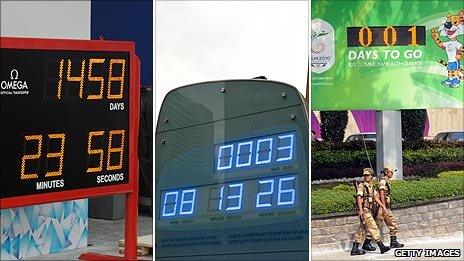Olympics clock: The joy of countdowns
- Published
- comments

A timer showing the 500 days to go until the 2012 Olympics is being unveiled in London, but why are these countdowns so beguiling, asks John Morton, writer of comedy Twenty Twelve.
Remember Ken Livingstone's "live" running unemployment total on the old GLC building in London? Or there's the US National Debt Clock in Times Square. Or the live stock market prices and world financial indices snaking their way around the walls of the Thomson Reuters building in Canary Wharf.
There seems to be something hypnotic about watching history unfolding digitally in real time before our eyes.
But it's the clocks that count downwards towards a fixed point that really seem to have us in their thrall. How else could Countdown's 30-second analogue clock face with its plinky plonky musical accompaniment have dominated afternoon television for nearly 30 years as the procession of presenters, contestants, and fragrant letter-wranglers have come and gone beneath it.
And then there was the Millennium. Remember the mounting fear, presented to us as a kind of world-wide ticking bomb, that when the digits on our computer clocks finally flicked over to 2,000 all our planes would suddenly fall out of the sky?
And remember all those public Millennium clocks counting us down second by second through the final years, months, and days to the zero hour? The French had theirs ticking away outside the Centre Pompidou in Paris. The Queen unveiled London's at Greenwich with a thousand days to go.
In Dublin they had the brilliant idea of installing theirs underwater so that the time on its green-illuminated face would shine up through the waters of the Liffey. Needless to say it let in water, failed to tell the time correctly, and quickly earned its nickname of "The Time in the Slime".
Where are they all now?
There's something both fascinating and unsettling going on here, and perhaps it's not so much to do with the clocks as with time itself, or the way we perceive it. Maybe there's something about the certainty, the unavoidabiltiy of that journey down towards zero that taps into something buried deep within the collective psyche.
Parachutists call it ground rush. Apparently while you're falling through the sky and before you open your parachute the perception is that you're dropping towards the ground at a perfectly manageable speed. Yes it's exhilarating, but there's plenty of time to look around you and take in the wonder of it all.
But that's an illusion caused by the lack of visual cues. It's only when you drop below a certain height and suddenly become aware that the ground is rushing up to meet you that you realise how fast you've been falling all along.
2012
More sobering still, maybe there's an analogy here for the way we experience time over the course of a human life.
For most of our lives we drift along on the assumption that there's always going to be time left ahead of us to develop, modify, and realise our many and varied dreams in that portion of it, still unused, called the future.
And we're happy enough with this arrangement right up to the point where we become aware that we've run out of future. What happened? Of course the ground has been rushing up towards us all along, we just didn't realise how fast we'd been falling.
Maybe it goes some way to explaining the lure of the countdown clock. A thousand days to go - still a long way away. Five hundred days - still pretty much still talking about the future. A hundred days - anybody know how many months that is? Fifty days - wait a minute, hang on, that's less eight weeks.
Suddenly we're not going to make this. What happened to all the time?
So perhaps as Olympics fans watch the 500 days to go clock, they should have a quick glance at their to-do list.